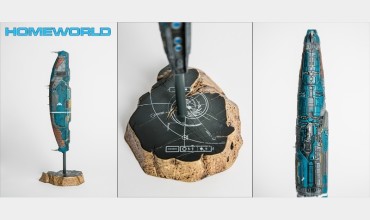An Interview With Paul Ruskay
We talk to the man behind the soundtracks of Homeworld and Strike Suit
As every Homeworld fan can attest, Paul Ruskay is a legend. If you’ve played Homeworld, you know what I’m talking about: that moment when Paul’s rendition of Adiago for Strings begins as the camera wraps around the Mothership’s scaffold…it’s one of the most poignant moments in gaming history. Paul’s soundtracks add significantly to every game he’s worked with, and I’ve been listening to his OST’s since 1999.
After a ~5 year hiatus from gaming, Strike Suit Zero pulled me back into space games 2013. Why? Because I saw that Paul Ruskay was behind the soundtrack. Yes, ladies and gentlemen, he is that good. You should have seen the FoH team slack channel when I said he’d emailed me back for an interview!
To us, his fans, he’s a celebrity. But who is the man behind these moving soundtracks? That’s what I wanted to find out. Unfortunately I haven’t been able to make it out to Vancouver yet (where Paul works with his company, Studio X Labs) but I did the next best thing: this interview.
You produced music for some of our favorite games (the Homeworld and Strike Suit titles), and both have a very eastern feel. How much creative freedom do/did you have when you made these soundtracks?
When producing a soundtrack or audio work in general, that work will be produced based on the needs of the development team. For me, most of the creative decisions about what the music will be are based on those day-to-day production demands from the development team. Questions like, what is the music being used for? What mood does it need to create? I’m responsible to match the tone and style of the music to the game design and narrative in a seamless way. It’s a world building exercise that happens on every project and with music; there are lots of possibilities of adding depth to the world you are creating. For all of the Homeworld and Strike Suit Zero projects, I was given a good amount of space to explore different directions. It seems with music, it’s pretty immediate if something is working or not. So when starting any new project, there is a bit exploration to find out what works or what feels correct to the world.
Since all of those projects had the original Homeworld music as a reference point, the developers wanted something similarly “Eastern” in feel. For Strike Suit Zero, Born Ready Games wanted a Homeworld influenced sound, but through the lens of Japanese Anime. So they asked me to take the responsibility for that part of the project. They needed someone to digest the game’s mechanics, narrative, visual style and technical requirements and deliver a musical/audio treatment that enhanced the overall game experience. For Strike Suit Zero, it was so great to collaborate with Kokia as her vocals brought such an amazing character to the soundtrack.
I really liked how the Strike Suit Theme song triggers when you first get the suit. It’s one of the moments where the music reinforces that something special is happening in terms of the game’s progression.
How much has the technical process of sound editing and composing changed in the last two decades? What was it like to compose music for HHomeworld back in 1999, and what’s different today?
The tools for producing music and audio for games have changed dramatically in the past 2 decades. When I was working on the Homeworld soundtrack in 1999, I was running a MIDI only version of Cakewalk and triggering samples from external sound modules like synths and samplers. Because of that setup, the Homeworld music had a unique sound based on the combination of triggering these sound modules. The primary sound sources used to create the Homeworld soundtrack was a Roland JV-1080 synth module with 4-expansion cards and an Emu sampler:
Rolan 1080 Series Synthesizer

Emu Audio Sampler

From those two sound modules, all the music and ambient textures of Homeworld were created. Since it was a MIDI-only sequencer setup, the final music track would have to be mixed down onto a 2-track DAT tape.
So that setup is primitive compared to what I work with now to produce a game’s soundtrack. Today’s audio production tools are designed to make it easier to maintain and quickly recall a huge number of music sessions. For example, Deserts of Kharak had over 100 Protools music mix sessions, with most of those mixes being active up until the game shipped. Also, data size for music in a game is not an issue anymore, so it creates the possibility of having a larger volume of music along with submixes for interactivity.
Now that game graphics have become on par with what Hollywood produces, the audio needs to match that “cinematic” quality but as a continuous immersive experience. The one thing that hasn’t changed from those early days is being on the lookout for those special “moments” where music and gameplay really merge together. I think it’s crucial as a composer or audio director to really listen to the game and actively choose what to emphasize from an audio perspective. Ultimately, you are trying to deliver music or sound that gives the audience a series of fully realized moments, where you maintain their suspension of disbelief and take them deeper into an experience.
You seem to favor electronic styles in your composition, do you listen to any electronic bands and if so, who are your favorites?
I guess I have a couple of favorites when it comes to full electronic music, groups that really capture a distinct mood. I like Biosphere, Eluvium, Rolly Porter and Stars of the Lid to name a few. I think for game composers, I really like Floex who did Samarost 3 and Machinarium soundtrack and Gareth Coker who did Ori and the Blind Forest. I have those on my iPhone quite often. Samarost 3 is such a unique and musical soundtrack. The inventiveness of Floex as a producer is really remarkable. I listen to his stuff when I am biking back and forth to the studio all the time.
Here’s your chance to ramble about your thoughts, inspirations, ups, and downs of your efforts for any/all Homeworld titles and SSZ. We really do want to know!
Well I think it’s enough to say that when I started Studio X Labs in February of 1999, that I would have any idea of what would transpire.
Strike Suit Zero soundtrack was my first commercial OST release and because Born Ready bundled the soundtrack with their game, the OST ended up selling really well. The experience with the Strike Suit Zero OST cemented the way forward for me as a business model.
As a small audio studio, all you really have is the ability to try and produce excellence on an opportunity. How it plays out and whether a production finds an audience is really outside of your control. You just have to do your best work and hope you are on a project that the gods smile on.
With Homeworld, and can you reveal details behind the decision to choose a Middle Eastern, tribal vibe for the soundtrack? Was that something you spearheaded yourself or was it something that was originally planned for by the team?
If I remember correctly, that sound emerged from me playing around with some tribal drum samples and in the context of a desert planet and space ships, that tribal sound really seemed to work. Also, the contrast between the tribal sound and the choral Adagio for Strings somehow just worked. When I started on the original Homeworld project in Oct of 1998, Relic didn’t really have a single player game at that point. There was no music so basically it was a blank canvas. I really didn’t get that much input or direction as Relic had their hands full with trying to figure out what the game was suppose to be. I do remember that the origins of Mission 01 track was inspired by a Delirium track that Alex Garden played me. It was a big synth piece with piano and I took that basic concept and the result was the Mission 01 track. The one great result from doing the first Homeworld soundtrack was that I was able to pretty much do what I wanted on future iterations of the franchise. The developers pretty much giving me free reign to create more “Homeworld music”.
What drew you to music, and when did you start composing?
This is going back a ways, but I started playing around with music sequencers in the early nineties which lead to my first job in the industry with Radical Entertainment where I was an audio lead. Radical was a great experience in learning the dynamic of team-based development and the ins and outs of a corporate environment. Without Radical, there would have been no way that I could of started Studio X Labs and be able to provide audio services using the outsource model. At the same time, I also got a gig doing student soundtracks at Digipen Computer Animation School when it was still located in Vancouver. So back in the mid-nineties I would be working at Radical Entertainment during the day on game productions and then producing student soundtracks in the evening. I did that pretty much during my stay at Radical so there was a lot of experiences of producing music under deadlines and time constraints. The game industry today is way more massive so there are more opportunities but also way more competition as well. Over the years Studio X Labs has moved around different industries and I’ve done my fair share of advertising, broadcast and film projects to keep the doors open and lights on. Music is one part of the equation, but equally important is voice production, sound design and post-production mixing. I guess you end up on the projects you are suppose to work on and from there you write the music you are suppose to write. At the end of the day, you are only as good as your working partners.
We loved ‘SSZ Remixed’ – any chance of more albums like this, perhaps remixing Homeworld soundtracks?
I would really like to try something like that again. It’s amazing to see what can happen when you let other music producers use a game’s soundtrack as source for remixes. The one lesson I took away from working with Born Ready Games was: You need to continually pitch ideas during development. Born Ready had enlisted the electronic-UK-based-band Subsource to remix the PC Launch trailer music and it was really great!
From that I thought maybe we could get a group of producers together and release an album of remixes. When I pitched the idea of a remix album to the guys from Born Ready they were like, “why not, go for it”. I think they were into the idea that there would be some new strike suit zero trailer music they could use for the console launch. I really like the PS4 launch music that DJ Wizard did. Also, Zardonic really made an inspired remix as well!
Strike Suit Zero Soundtrack Remixes

Like FoH?
Fists of Heaven is ad-free and always will be. If you enjoyed the content above, help us out by sharing this post, or by commenting and letting us know what content you like and want to see more of. Thanks for reading!






